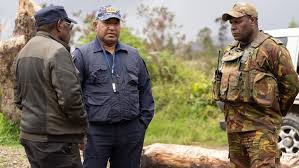-Papua New Guinea security personnel have been authorised to use “lethal force” to quell violence between illegal miners and traditional landowners near the economically important Porgera gold mine.
Fighting in the volatile highlands province of Enga erupted last week and rapidly escalated, prompting the declaration of a state of emergency, authorities said.
Video and photos circulating online appear to show heavily armed men walking through Porgera township, buildings on fire, and women and children displaced by the unrest.
Police Commissioner David Manning has told officers to treat anyone with a weapon as an imminent threat to life.
“Put simply, this means if you raise a weapon in a public space or threaten another person, you will be shot,” Manning said in a statement released on Saturday.
“The deteriorating situation has been caused by illegal miners and illegal settlers who are victimizing traditional landowners and using violence to terrorise local communities.”
An additional 122 security personnel, including police mobile squads and soldiers, have been deployed to restore order to the area. Security forces have been told to clear out the illegal miners and protect critical infrastructure, Manning said.
“We also call on the landowners to support security force operations for the protection of their people and infrastructure on their land,” he said.
Local media have reported up to 20 people were killed in the recent fighting, in the lead up to celebrations for PNG’s 49th independence day on Monday.
The Porgera gold mine, an open pit and underground mine about 600km (372 miles) northwest of the capital Port Moresby, resumed operations on 22 December 2023 after its lease was suspended by the government in 2019.
The mine’s reopening under a new, partly foreign-owned venture New Porgera Limited resulted in a surge of illegal miners into a region that already struggles with law and order.
It’s unclear how many unauthorised miners are operating within the area, but conflict between the migrants and traditional landowners has been increasing, according to authorities.
Canada’s Barrick Gold Corp, which operates and part owns the Porgera along with China’s Zijin Mining Group, did not immediately respond to a request for comment on how the unrest was affecting operations.
But New Porgera in an internal memo to staff on Sunday, which has been seen by BenarNews, said the majority of operations would be suspended until Sept. 18 because it could not guarantee the safety of its staff.
“Over the past twenty-four hours a significant escalation in tribal fighting has impacted many of our employees,” James McTiernan, the company’s general manager, said in a statement. “Homes have been destroyed, family and friends injured or killed, and people have been unable to sleep while living in fear.”
The company said local employees who needed time off to relocate family or find new accommodation could take leave without pay. The intention was to resume full operations on Thursday, it said.
Porgera and large parts of the surrounding area have been isolated except by air and foot since a deadly landslide in May killed over 100 people and cut the only road to the mine site.
Spasms of violence, often involving feuding tribes, are not uncommon in parts of PNG, the Pacific Islands’s most populous nation with an estimated 12 million people.
The latest clashes come just a week after a visit by the head of the Catholic Church Pope Francis to the country where he called for an end to tribal violence and the equitable distribution of wealth from natural resources.
PNG is endowed with significant mineral and other resources, but it has struggled to develop economically because of corruption, poor infrastructure and security problems.
In recent years, violent clashes in the remote and underdeveloped highlands have become more lethal due to an influx of modern automatic weapons.
PNG has one police officer for about every 1,800 people, nearly four times less than the level recommended by the United Nations to ensure law and order, according to a Griffith Asia Institute report released last year. The ratio of police to people has declined substantially in the past half century as PNG’s population tripled.
Opened in 1990, the Porgera mine has been a source of conflict for years.
Barrick and Zijin Mining agreed in 2021 to halve their combined stake in the mine to just under 50% following the PNG government’s refusal to renew Porgera’s license.
The mine employs over 3,300 Papua New Guineans and has contributed approximately 10-percent of PNG’s total annual exports, according to the company website.
Local interests such as the provincial government and traditional landowners are now the majority owners.













